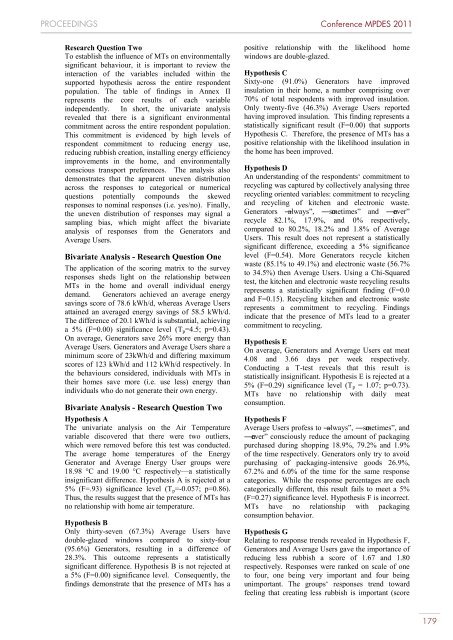Martina Schäfer, Noara Kebir, Daniel Philipp (editors) - TU Berlin
Martina Schäfer, Noara Kebir, Daniel Philipp (editors) - TU Berlin
Martina Schäfer, Noara Kebir, Daniel Philipp (editors) - TU Berlin
Create successful ePaper yourself
Turn your PDF publications into a flip-book with our unique Google optimized e-Paper software.
PROCEEDINGS Conference MPDES 2011<br />
Research Question Two<br />
To establish the influence of MTs on environmentally<br />
significant behaviour, it is important to review the<br />
interaction of the variables included within the<br />
supported hypothesis across the entire respondent<br />
population. The table of findings in Annex II<br />
represents the core results of each variable<br />
independently. In short, the univariate analysis<br />
revealed that there is a significant environmental<br />
commitment across the entire respondent population.<br />
This commitment is evidenced by high levels of<br />
respondent commitment to reducing energy use,<br />
reducing rubbish creation, installing energy efficiency<br />
improvements in the home, and environmentally<br />
conscious transport preferences. The analysis also<br />
demonstrates that the apparent uneven distribution<br />
across the responses to categorical or numerical<br />
questions potentially compounds the skewed<br />
responses to nominal responses (i.e. yes/no). Finally,<br />
the uneven distribution of responses may signal a<br />
sampling bias, which might affect the bivariate<br />
analysis of responses from the Generators and<br />
Average Users.<br />
Bivariate Analysis - Research Question One<br />
The application of the scoring matrix to the survey<br />
responses sheds light on the relationship between<br />
MTs in the home and overall individual energy<br />
demand. Generators achieved an average energy<br />
savings score of 78.6 kWh/d, whereas Average Users<br />
attained an averaged energy savings of 58.5 kWh/d.<br />
The difference of 20.1 kWh/d is substantial, achieving<br />
a 5% (F=0.00) significance level (Tp=4.5; p=0.43).<br />
On average, Generators save 26% more energy than<br />
Average Users. Generators and Average Users share a<br />
minimum score of 23kWh/d and differing maximum<br />
scores of 123 kWh/d and 112 kWh/d respectively. In<br />
the behaviours considered, individuals with MTs in<br />
their homes save more (i.e. use less) energy than<br />
individuals who do not generate their own energy.<br />
Bivariate Analysis - Research Question Two<br />
Hypothesis A<br />
The univariate analysis on the Air Temperature<br />
variable discovered that there were two outliers,<br />
which were removed before this test was conducted.<br />
The average home temperatures of the Energy<br />
Generator and Average Energy User groups were<br />
18.98 °C and 19.00 °C respectively—a statistically<br />
insignificant difference. Hypothesis A is rejected at a<br />
5% (F=.93) significance level (Tp=-0.057; p=0.86).<br />
Thus, the results suggest that the presence of MTs has<br />
no relationship with home air temperature.<br />
Hypothesis B<br />
Only thirty-seven (67.3%) Average Users have<br />
double-glazed windows compared to sixty-four<br />
(95.6%) Generators, resulting in a difference of<br />
28.3%. This outcome represents a statistically<br />
significant difference. Hypothesis B is not rejected at<br />
a 5% (F=0.00) significance level. Consequently, the<br />
findings demonstrate that the presence of MTs has a<br />
positive relationship with the likelihood home<br />
windows are double-glazed.<br />
Hypothesis C<br />
Sixty-one (91.0%) Generators have improved<br />
insulation in their home, a number comprising over<br />
70% of total respondents with improved insulation.<br />
Only twenty-five (46.3%) Average Users reported<br />
having improved insulation. This finding represents a<br />
statistically significant result (F=0.00) that supports<br />
Hypothesis C. Therefore, the presence of MTs has a<br />
positive relationship with the likelihood insulation in<br />
the home has been improved.<br />
Hypothesis D<br />
An understanding of the respondents‘ commitment to<br />
recycling was captured by collectively analysing three<br />
recycling oriented variables: commitment to recycling<br />
and recycling of kitchen and electronic waste.<br />
Generators ―always‖, ―sometimes‖ and ―never‖<br />
recycle 82.1%, 17.9%, and 0% respectively,<br />
compared to 80.2%, 18.2% and 1.8% of Average<br />
Users. This result does not represent a statistically<br />
significant difference, exceeding a 5% significance<br />
level (F=0.54). More Generators recycle kitchen<br />
waste (85.1% to 49.1%) and electronic waste (56.7%<br />
to 34.5%) then Average Users. Using a Chi-Squared<br />
test, the kitchen and electronic waste recycling results<br />
represents a statistically significant finding (F=0.0<br />
and F=0.15). Recycling kitchen and electronic waste<br />
represents a commitment to recycling. Findings<br />
indicate that the presence of MTs lead to a greater<br />
commitment to recycling.<br />
Hypothesis E<br />
On average, Generators and Average Users eat meat<br />
4.08 and 3.66 days per week respectively.<br />
Conducting a T-test reveals that this result is<br />
statistically insignificant. Hypothesis E is rejected at a<br />
5% (F=0.29) significance level (Tp = 1.07; p=0.73).<br />
MTs have no relationship with daily meat<br />
consumption.<br />
Hypothesis F<br />
Average Users profess to ―always‖, ―sometimes‖, and<br />
―never‖ consciously reduce the amount of packaging<br />
purchased during shopping 18.9%, 79.2% and 1.9%<br />
of the time respectively. Generators only try to avoid<br />
purchasing of packaging-intensive goods 26.9%,<br />
67.2% and 6.0% of the time for the same response<br />
categories. While the response percentages are each<br />
categorically different, this result fails to meet a 5%<br />
(F=0.27) significance level. Hypothesis F is incorrect.<br />
MTs have no relationship with packaging<br />
consumption behavior.<br />
Hypothesis G<br />
Relating to response trends revealed in Hypothesis F,<br />
Generators and Average Users gave the importance of<br />
reducing less rubbish a score of 1.67 and 1.80<br />
respectively. Responses were ranked on scale of one<br />
to four, one being very important and four being<br />
unimportant. The groups‘ responses trend toward<br />
feeling that creating less rubbish is important (score<br />
179


